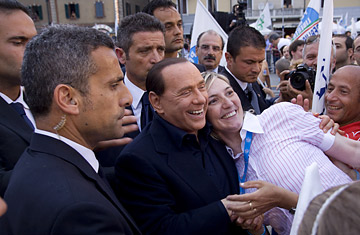
Italian Prime Minister Silvio Berlusconi is greeted by well-wishers during the closing rally of a campaign for his Freedom People's party for Italy's administrative elections
The signs of danger, however, are undeniable. Ever since his wife's request in April for divorce sparked questions about his personal life, Berlusconi has been noticeably edgy. Now he faces criticism even from some of his most trusted allies.
The latest brouhaha began two months ago, when Berlusconi's wife of 20 years, Veronica Lario, announced the end of their marriage and accused him of "frequenting underage females." The Prime Minister then spent weeks fending off questions about his relationship with an 18-year-old Neapolitan blonde named Noemi Letizia, after he arrived at her birthday party with a gift of a diamond necklace.
Berlusconi largely quieted that episode with explicit denials of anything "spicy" in his relationship with Letizia. But a potentially more damaging turn came last week, when investigators in the southern city of Bari confirmed that they were probing accusations that a local businessman, Giampaolo Tarantini, paid for women to attend dinners and parties at Berlusconi's private Rome residence, Palazzo Grazioli, and his villa on the island of Sardinia. One of the women, Patrizia D'Addario, had told Milan daily Corriere della Sera that she was paid several thousand euros to attend two dinner parties at Palazzo Grazioli last fall, and stayed the night of Nov. 4. D'Addario, who was also offered the candidacy in Bari local elections with the backing of Berlusconi's Freedom People's party, says she secretly made audio recordings of the encounters, which she turned over to prosecutors.
Now it has emerged that one of D'Addario's friends from Bari, Barbara Montereale, was also paid to be at the Nov. 4 party. Montereale told Rome daily La Repubblica that she left after dinner and described D'Addario as a professional escort. Montereale says D'Addario told her that she'd had sex with the Prime Minister on Nov. 4. In subsequent interviews, D'Addario has neither confirmed nor denied Montereale's account.
Montereale says she subsequently attended a party at the Sardinian villa, which was filled with a score of other young, attractive women, including several dressed as Santa Claus. She says that Berlusconi gave her an envelope of cash to help with the costs of raising her child alone but insists that she did not have any physical contact with him.
Tarantini told Italian news agency ANSA that he reimbursed the women only for their travel and expenses, adding that Berlusconi didn't know about the payments.
Berlusconi has dismissed the newspaper accounts as "trash" and insisted on forging ahead with his work, including plans for the G-8 summit next month in L'Aquila, the central Italian city that was devastated by an earthquake in April. But allies have begun to question his past behavior and current handling of the crisis. Industry Minister Claudio Scajola, publicly one of Berlusconi's most loyal allies, counseled "more prudence" to the man in charge, though ultimately he blamed the woes on opposition hatchet men. Conservative newspaper editor Giuliano Ferrara, a longtime behind-the-scenes adviser, was less forgiving, writing in a column last week that the Prime Minister essentially had to choose between continuing with "parties and beautiful girls" and seeing through his political agenda. Berlusconi has also been urged to respond publicly and in detail to the accusations by Avvenire, the newspaper of the influential Italian Bishops Conference.
Yet those predicting Berlusconi's fall must remember that he has single-handedly rewritten the rules of Italian politics. He carries unprecedented weight with television news broadcasts, both in his ownership of private channels and his influence over the management of state broadcaster RAI. (Leading nightly news TG1 has been roundly criticized for its vague and misleading reports on the scandal.) Berlusconi's power goes beyond just the physical instruments of communication. He has perfected the art of politics as an around-the-clock magician's act. And in Italy, the only thing more difficult than trying to imagine how he can avoid disappearing is imagining what public life would be like without him.
